28 releases (stable)
| 1.0.19 | Apr 10, 2023 |
|---|---|
| 1.0.16 | Mar 21, 2023 |
| 1.0.14 | Sep 16, 2022 |
| 0.2.3 | Jul 10, 2022 |
| 0.1.3 | Jul 9, 2022 |
#68 in Debugging
Used in hmw
99KB
1.5K
SLoC
nolog logger
Convenient and 'beautiful by default' logger for debugging your programs.
Easy to use, complete documentation is provided on this page. Zero deps.
No unsafe (by #![deny(unsafe_code)]).
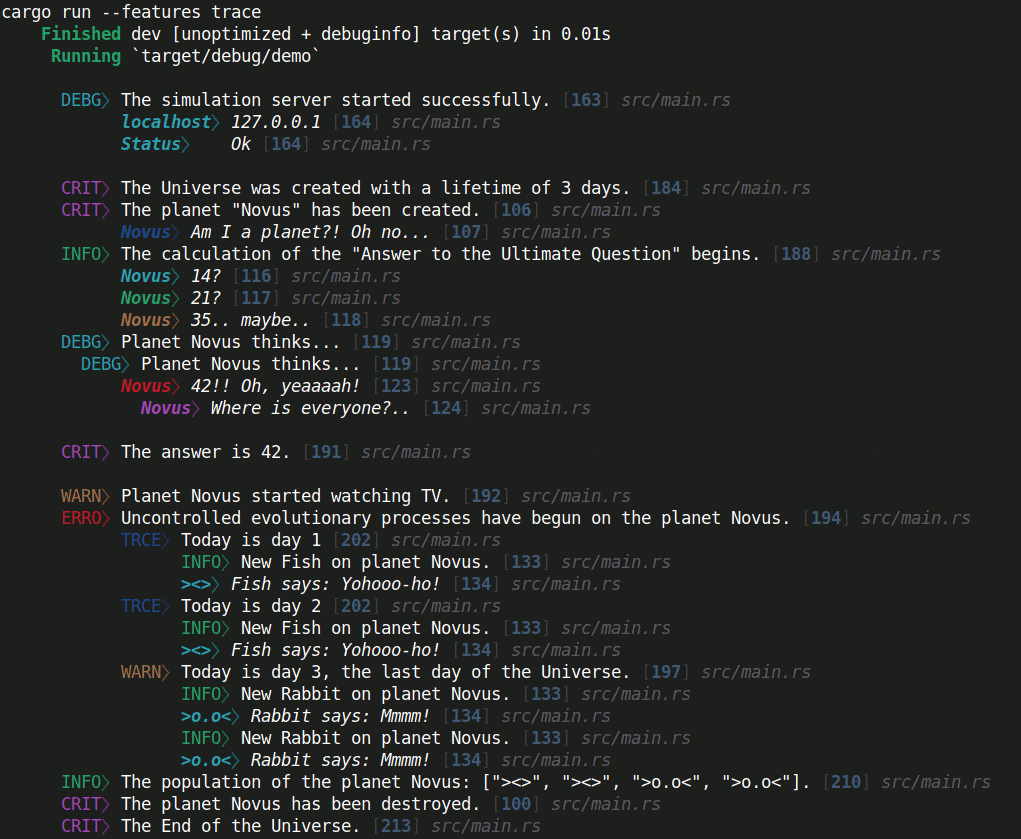
nolog features
- In most cases
nologuses astd::format_args!()(that avoids heap allocations) and compile-time level filtering by Cargo features. If you use the default setup without additional features (likelogmod,logonly,logcatch,tofile), then in most casesnologwill only work on compile-time macros without using functions, methods,ifor loops. In fact it will expand into the stringeprintln!("{}", format_args!("{}{}{}{}"," ", "CRIT⧽", "msg", "[34] src/main.rs"));. Nothing extra. - Filtering by module path (
logmodfeature). - Display messages only from a selected section of code (
logonlyfeature). - Smart logging: hide all messages, show the previous
Хmessages if anerrororcritlevel message was triggered (logcatchfeature). - A custom indent can be added to the message, as well as a number of blank lines before and after it. You can use variables (eg loop counter) to set the indent for the selected message.
- Easily adjust and disable all indents and newlines with features.
- Сustomization: you can create your own color scheme for the logger.
- Support for named format arguments:
info!("{line_count} lines.");. - Support for
key => valuesyntax:info!("{server}" => "{ip}"); - Automatically disabled in the release build:
cargo run --release. If you want the log to be enabled in the release build, then usereleasefeature:nolog = {version = "*", features = ["release"]}. - All levels are disabled by default. Turning on the
debuglevel also turns on the levels above it:info,warn,error,crit. Level can be enabled using the console:cargo run --features debugor inCargo.toml:nolog = {version = "*", features = ["debug"]}. To enable all levels:cargo run --features trace. - By default, the log is writting to
stderr. You can log to a file withtofilefeature. You may set the buffer size. Automatic flush after each message will be used. If you want wait for the buffer to fill or to do it manually withlogflush!()then useno_auto_flushfeature. - Custom output redirection. For example, to a
fileand tostderrat the same time. - You can add a timestamp like
[2022-07-10 06:49:33.646361181 UTC]using a third party library you like. How to add a timestamp. - Support for chaining multiple messages into one (they must all be
of the same type:
usualorkey-value):
info!(
"{server}" => "{ip}";
"Status" => "{server_check_result}";
);
Table of contents
- Using nolog
- Using nolog with
--features - Tofile. Writing log entries to a file
- How to add a timestamp
- Styles
- Chaining
- Logmod. Filtering by module path
- Logonly. Display messages only from a selected section of code
- Logcatch. Smart logging
- Quick disable and enable messages
- Indentation and new lines
- Colors
- Level headers
- Don't disable logger in release build
- Location
- Separator
- Custom color scheme
- Custom output redirection
- Other customization options
- Logging in tests
- Changelog
Using nolog
Cargo.toml
[dependencies]
nolog = { version = "1", features = ["trace"] }
main.rs
#[macro_use]
extern crate nolog;
fn main() {
trace!("line_count: {}", 42);
debug!("line_count: {}", 42);
info!("line_count: {}", 42);
warn!("line_count: {}", 42);
error!("line_count: {}", 42);
crit!("line_count: {}", 42);
}
cargo run
Result:
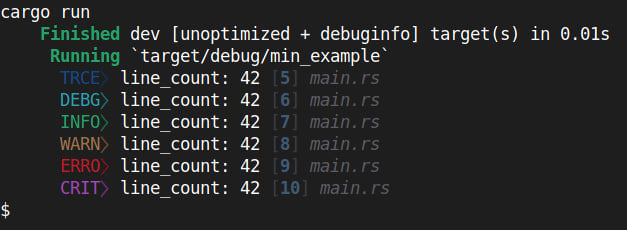
You can enable more output filtering features in cargo.toml:
- Logonly. Display messages only from a selected section of code. Useful with
tracelevel. - Logcatch. Smart logging. Hide all messages, show the previous
Хmessages if anerrororcritlevel message was triggered. Allows you to understand what preceded the error. - Logmod. Filtering by module path. Receive messages only from the module you are currently working on.
Cargo.toml
[dependencies]
nolog = { version = "1", features = [
"debug",
"logonly",
"logcatch",
"logmod",
]}
In addition, you can customize the appearance settings.
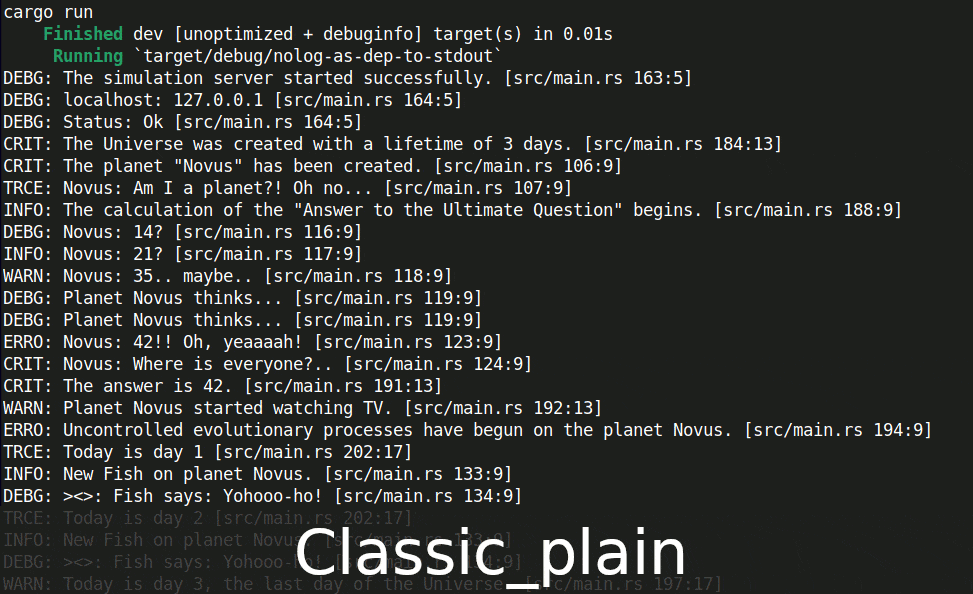
Appearance settings classic:
Cargo.toml
[dependencies]
nolog = { version = "1", features = [
"debug",
"show_lvl_header_kv",
"indent_ignore_all",
"newline_ignore",
"location_style_classic",
"sep_colon",
]}
Appearance settings classic_plain:
Cargo.toml
[dependencies]
nolog = { version = "1", features = [
"debug",
"plain",
"show_lvl_header_kv",
"indent_ignore_all",
"newline_ignore",
"location_style_classic",
"sep_colon",
]}
Indentation.
You can specify indentation in the following way:
crit!(->[X,Y,Z] "msg");
X- Indents.Y- AddYblank lines before message.Z- AddZblank lines after message.
All of these arguments are optional:
crit!("msg");
// X
crit!(->[1] "msg");
// X Y
crit!(->[6,1] "msg");
// X Y Z
crit!(->[1,2,3] "msg");
If you want to add blank lines and leave the default indentation:
// X Y
crit!(->[_,1] "msg");
// X Y Z
crit!(->[_,_,2] "msg");
The same works for each message in the chain.
debug!(
->[2] "msg 1";
->[_,1] "msg 2";
"msg 3";
);
Key-values have the additional ability to set indentation not only for the key, but also for the value.
debug!(->[_,1] "The simulation server started successfully.");
debug!(
"{server}" => "{ip}";
"Status" => ->[3] "{server_check_result}";
);
crit!(->[_,1] "The Universe was created with a lifetime of {} days.", universe.len());
This allows you to get nice aligned output if you want.

Read more about indentation.
Using nolog with --features
You need to completely copy the contents of this file to your cargo.toml.
Then you can write cargo run --features trace,logonly instead of
cargo run --features nolog/trace,nolog/logonly See example on GitHub.
Cargo.toml
[dependencies]
nolog = { version = "1", features = [] }
[features]
nolog_setup = []
# example `classic`
#nolog_setup = ["nolog/show_lvl_header_kv", "nolog/indent_ignore_all", "nolog/newline_ignore", "nolog/location_style_classic", "nolog/sep_colon"]
# example `classic_plain`
#nolog_setup = ["nolog/plain", "nolog/show_lvl_header_kv", "nolog/indent_ignore_all", "nolog/newline_ignore", "nolog/location_style_classic", "nolog/sep_colon"]
trace = ["nolog/trace", "nolog_setup"]
debug = ["nolog/debug", "nolog_setup"]
info = ["nolog/info", "nolog_setup"]
warn = ["nolog/warn", "nolog_setup"]
error = ["nolog/error", "nolog_setup"]
crit = ["nolog/crit", "nolog_setup"]
logonly = ["nolog/logonly"]
logcatch = ["nolog/logcatch"]
logmod = ["nolog/logmod"]
The commented lines nolog_setup = ["nolog/show_lvl_h...] are
the appearance settings (indents, color scheme, styles, etc).
Uncomment one of them to see what happens (don't forget
to remove nolog_setup = []).
Appearance settings are selected using conditional compilation, so they have a zero cost.
main.rs
#[macro_use]
extern crate nolog;
fn main() {
trace!("line_count: {}", 42);
debug!("line_count: {}", 42);
info!("line_count: {}", 42);
warn!("line_count: {}", 42);
error!("line_count: {}", 42);
crit!("line_count: {}", 42);
}
nolog has the same syntax as most loggers based on the log crate.
nolog extends the log crate syntax by adding new features.
However, nolog is not based on log crate, it just has the same
macro names. This also results in the nolog having 0 dependencies.
Therefore, switching to nolog will require minimal changes in the code.
Ok. Now we can use the following command:
cargo run --features trace
Or, for example
# The output will be empty because there are no logonly
# blocks, etc. in the code.
# This is just to demonstrate the use of several features.
cargo run --features trace,logonly,logcatch,logmod
It's the same but noisier
# The output will be empty because there are no logonly
# blocks, etc. in the code.
# This is just to demonstrate the use of several features.
cargo run --features nolog/trace,nolog/logonly,nolog/logcatch,nolog/logmod
Result:

Tofile. Writing log entries to a file
Cargo.toml
#...
[dependencies]
nolog = { version = "1", features = ["tofile"] }
#...
main.rs
use std::fs::OpenOptions;
use std::io::{self, Read};
use std::path::PathBuf;
#[macro_use]
extern crate nolog;
fn main() -> io::Result<()> {
let path = PathBuf::from("log.txt");
let file = OpenOptions::new()
.read(true)
.write(true)
.create(true)
.truncate(true)
//^^^^^^^ truncate the file to 0 length if it already exists.
//.append(true)
.open(&path)?;
// Initialization
// Don't use macros like `debug!("msg");` before initialization.
logfile!(file);
trace!("Hello from file!");
let mut file = OpenOptions::new()
.read(true)
.open(&path)?;
let mut contents = String::new();
file.read_to_string(&mut contents)?;
println!("\n -- In {path:?} --");
println!("{contents}");
Ok(())
}
Optionally, you can set the buffer size.
// Buffer `std::io::BufWriter` with capacity: 8000 bytes.
logfile!(8000, file);
The default is to automatically flush after each message.
If you want wait for the buffer to fill or to do it manually
with logflush!() then use no_auto_flush feature.
Cargo.toml
#...
[dependencies]
nolog = { version = "1", features = ["tofile", "no_auto_flush"] }
#...
Then use logflush!() to flush the log manually.
main.rs
...
// Initialization
// Don't use macros like `debug!("msg");` before initialization.
logfile!(8000, file);
trace!("Hello from file!");
logflush!();
...
How to add a timestamp
You can add a timestamp like [2022-07-10 06:49:33.646361181 UTC]
using a third party library you like.
For this example, we will use chrono crate.
Cargo.toml
#...
[dependencies]
nolog = { version = "1", features = [] }
chrono = "0.4"
[features]
custom_leading = ["nolog/custom_leading"]
custom_trailing = ["nolog/custom_trailing"]
custom_before_msg = ["nolog/custom_before_msg"]
custom_after_msg = ["nolog/custom_after_msg"]
nolog_setup = ["custom_leading"]
#...
We have 4 options here:
- "custom_leading" -
<TIMESTAMP>CRIT⧽ msg [5] src/main.rs - "custom_trailing" -
CRIT⧽ msg [5] src/main.rs<TIMESTAMP> - "custom_before_msg" -
CRIT⧽ <TIMESTAMP>msg [5] src/main.rs - "custom_after_msg" -
CRIT⧽ msg<TIMESTAMP> [5] src/main.rs
Log entry structure:
usual:
<indents><custom_leading><lvlheader><sep><custom_before_msg><msg><custom_after_msg><location><custom_trailing>
key-value:
<indents><custom_leading><lvlheader><sep_kv><custom_before_msg><key><sep_key><value_indent><value><custom_after_msg><location><custom_trailing>
Here is an example:
main.rs
#[macro_use]
extern crate nolog;
#[macro_use]
pub mod logger_setup {
#[macro_export]
#[cfg(feature = "custom_leading")] macro_rules!
// ^^^^^^^^^^^^^^
custom_leading {
// usual
( $level:tt, $indent:expr, $($msg:expr),* ) => {
format_args!("[{}] ", chrono::Utc::now())
};
// key-value
( $level:tt, $indent:expr, $($key:expr),* => $($value:expr),* ) => {
format_args!("[{}] ", chrono::Local::now())
};
}
}
mod other {
pub fn from_other_mod() -> () {
crit!(->[0] "Other" => "Hello from other mod! This is key-value msg.");
}
}
fn main() {
crit!("Hello from main! This is usual msg.");
other::from_other_mod();
}
Output:
[2022-09-07 09:22:09.150921578 UTC] CRIT⧽ Hello from main! This is usual msg. [34] src/main.rs
[2022-09-07 12:22:09.150973037 +03:00] Other⧽ Hello from other mod! This is key-value msg. [29] src/main.rs
With classic style:
[2022-09-07 09:29:45.859185734 UTC] CRIT: Hello from main! This is usual msg. [src/main.rs 34:5]
[2022-09-07 12:29:45.859225186 +03:00] CRIT: Other: Hello from other mod! This is key-value msg. [src/main.rs 29:9]
Styles
Default
nolog_setup = []
classic
nolog_setup = ["nolog/show_lvl_header_kv", "nolog/indent_ignore_all", "nolog/newline_ignore", "nolog/location_style_classic", "nolog/sep_colon"]
classic_plain
nolog_setup = ["nolog/plain", "nolog/show_lvl_header_kv", "nolog/indent_ignore_all", "nolog/newline_ignore", "nolog/location_style_classic", "nolog/sep_colon"]
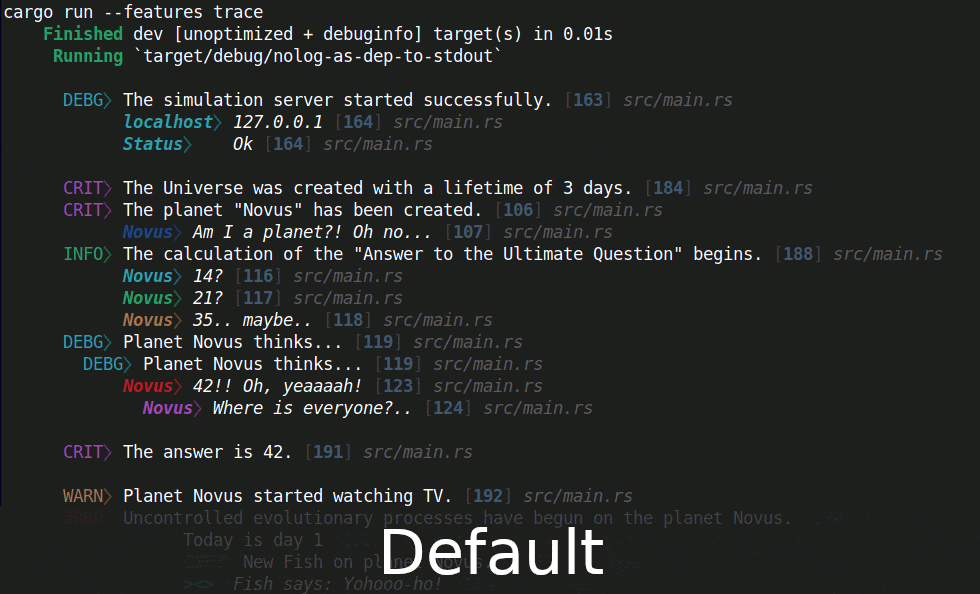
Chaining
Messages in a chain should all be of the same type: usual or key-value
ususal
debug!(
"Planet {name} thinks...";
"Planet {name} thinks...";
);
key-value
debug!(
"{server}" => "{ip}";
"Status" => "{server_check_result}";
);
Logmod. Filtering by module path
Add it as early as possible in the code:
logmod!(
[ ] main,
[!=] crate::other2,
);
[]- Include a module and all its submodules.[=]- the same (Include a module and all its submodules).[!]- Exclude a module and all its submodules.[==]- Include only this module without submodules.[!=]- Exclude only this module without submodules.
Then
cargo run --features trace,logmod
Logonly. Display messages only from a selected section of code
This is useful for debugging to get messages from just a small piece of code.
logonly!(
let universe = [0;3];
crit!("The Universe was created with a lifetime of {} days.", universe.len());
error!("Uncontrolled evolutionary processes have begun on the planet {planet_name}.");
);
Then
cargo run --features trace,logonly
You can use any brackets
logonly!(), logonly!{}, logonly![].
You can use multiple logonly!() blocks. Messages will be displayed from all.
It won't break your code when the logger turns off in release build. So you can leave these blocks in the code.
When disabled, the definition of this macro will be replaced with the following:
logonly { ( $($a:tt)* ) => { $($a)* }; }
It simply writes down the code it received.
Logcatch. Smart logging
Hide all messages, show the previous Х messages if an error or crit
level message was triggered.
By default X=10. You can change this anywhere in the code.
// This will take effect for the code below.
logcatch!(2); // now X=2
To enable this feature, use:
cargo run --features trace,logcatch
Each new line created with newline!() or ->[_,1,1](about
what it will be below) counts as a separate message.
Quick disable and enable messages
You can disable individual messages without removing them from the code.
A macro like debug!([_]; "msg") will expand into an empty tuple ().
// on
info!([#]; "New {name} on planet {planet_name}.");
// off
info!([_]; "{repr}" => "{name} says: {speech}");
You can use any options you like:
On:
[#], [x], [v], [+], [on], [true], [your_var]
Off:
[ ], [_], [-], [off], [false], [your_var]
your_var should be bool.
To change states, you need to change only one character:
[_] --> [#].
This also works with chained messages, but disables the entire chain. You can't turn off a single message in a chain.
crit!([_];
"The answer is {answer}.";
"Planet {planet_name} started watching TV.";
);
You can turn off the action of block logonly. This will not affect
the code, the effect is as if macro logonly was not in this place.
logonly!{[_];
crit!("The answer is {answer}.");
let x = 42;
}
This way you can leave logonly!() in the code and if it is required
in the future just enable it.
Variables and expressions
If necessary, you can control messages using variables and expressions.
let my_log_enabled = true;
crit!([my_log_enabled]; "The planet {} has been destroyed.", self.name);
let status = "ok";
crit!([(status == "ok")]; "The planet {} has been destroyed.", self.name);
// ^ ^
// Add parentheses
fn is_message_show_fn () -> bool { false }
...
crit!([(is_message_show_fn())]; "The planet {} has been destroyed.", self.name);
// ^ ^
// Add parentheses
Indentation and new lines
new lines
newline!(2); - It will simply write the passed number of new lines to the log.
Indentation
Indents are of several types:
Base indent
Base indent will be added to every line.
- Default for all:
6indents. One indent equals one space.
You can change base indent with cargo features:
indent_base_zeroindent_base_oneindent_base_twoindent_base_threeindent_base_fourindent_base_fiveindent_base_sevenindent_base_eightindent_base_nineindent_base_ten
For example in Cargo.toml:
nolog_setup = ["nolog/indent_base_zero"]
trace = ["nolog/trace", "nolog_setup"]
The indent of the selected message
- Default for
usual: 0 - Default for
key-value: 6
The default indentation is used if no value has been provided by the user.
You can specify indentation in the following way:
crit!(->[X,Y,Z] "msg");
X- Indents.Y- AddYblank lines before message (same effect asnewline!(Y)).Z- AddZblank lines after message.
All of these arguments are optional:
crit!("msg");
crit!(->[1] "msg");
crit!(->[6,1] "msg");
crit!(->[1,2,3] "msg");
crit!([#]; ->[1,2,3] "msg");
If you want to add blank lines and leave the default indentation:
crit!(->[_,1] "msg");
crit!(->[_,_,2] "msg");
The same works for each message in the chain.
debug!(
->[2] "Planet {name} thinks...";
->[_,1] "Planet {name} thinks...";
"Planet {name} thinks...";
);
key => value have an indentation of 6 by default, but you can reset
it by setting it to zero.
error!(->[0] "{name}" => "{}!! Oh, yeaaaah!", 2*3*7);
Or you can do it via Cargo.toml for all messages.
indent_kv_default_zeroindent_kv_default_oneindent_kv_default_twoindent_kv_default_threeindent_kv_default_fourindent_kv_default_fiveindent_kv_default_sevenindent_kv_default_eightindent_kv_default_nineindent_kv_default_ten
For example in Cargo.toml:
nolog_setup = ["nolog/indent_kv_default_zero"]
trace = ["nolog/trace", "nolog_setup"]
Key-values have the additional ability to set indentation not only for the key, but also for the value.
debug!(
"{server}" => "{ip}";
"Status" => ->[3] "{server_check_result}";
);
This allows you to get nice aligned output if you want.

Indent variables
You can use variables to set the indentation and add blank lines.
for i in 0..2 {
warn!(->[i,i,i] "msg");
}
Ignore all indents
Ignore all types of indentation.
nolog_setup = ["nolog/indent_ignore_all"]
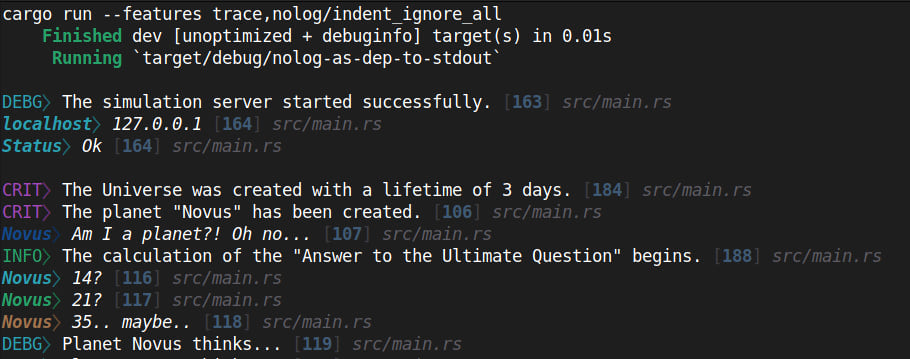
Ignore all newlines
nolog_setup = ["nolog/newline_ignore"]
Colors
nolog colored by default, use this feature for plain output:
nolog_setup = ["nolog/plain"]
Level headers
nolog_setup = ["nolog/show_lvl_header_kv"]
Show level name for key-value:
CRIT: Key: value [src/main.rs 90:5]`
^^^^
It's disabled by default:
Key: value [src/main.rs 90:5]
Don't disable logger in release build
nolog = { version = "1", features = ["release"] }
Location
Don't show location (like [src/main.rs 155:9])
nolog_setup = ["nolog/location_hide"]
Style like this: [src/main.rs 155:9]
nolog_setup = ["nolog/location_style_classic"]

Separator
Default = "⧽ "
- ": "
nolog_setup = ["nolog/sep_colon"]
- " "
nolog_setup = ["nolog/sep_space"]
- ""
nolog_setup = ["nolog/sep_hide"]
Custom color scheme
You can create your own color scheme for the logger.
Cargo.toml
#...
[dependencies]
nolog = { version = "1", features = [] }
[features]
custom_colors = ["nolog/custom_colors"]
nolog_setup = ["custom_colors"]
#...
Here is an example:
main.rs
#[macro_use]
extern crate nolog;
#[macro_use]
pub mod logger_setup {
#[macro_export]
#[cfg(feature = "custom_colors")] macro_rules!
// ^^^^^^^^^^^^^
color {
( [trace] ) => { "\x1B[34m" };
( [debug] ) => { "\x1B[36m" };
( [info] ) => { "\x1B[32m" };
( [warn] ) => { "\x1B[33m" };
( [error] ) => { "\x1B[31m" };
( [crit] ) => { "\x1B[35m" };
( [sep] ) => { "\x1B[1m\x1B[2m" }; // +bold +dim
( [msg] ) => { "" }; // default term font color
( [from] ) => { "\x1B[90m\x1B[3m" }; // `[src/main.rs 101:5]` in `location_style_classic`
( [sep2] ) => { "\x1B[90m\x1B[2m" }; // sep2 in default style
( [sep3] ) => { "\x1B[90m\x1B[2m" }; // sep3 in default style
( [line] ) => { "\x1B[38;5;67m\x1B[1m\x1B[2m" }; // line number in default style
( [key] ) => { "\x1B[3m\x1B[1m" }; // +italic +bold
( [value] ) => { "\x1B[3m" }; // +italic
( [rm] ) => { "\x1B[0m" }; // remove previous colors
}
}
mod other {
pub fn from_other_mod() -> () {
crit!(->[0] "Other" => "Hello from other mod! This is key-value msg.");
}
}
fn main(){
crit!("Hello from main! This is usual msg.");
other::from_other_mod();
}
Custom output redirection
It is possible to redirect output. For example, we will redirect output to stderr and to a file at the same time. The limitation is that output to stderr will be the same as to a file, it will not be colorized.
Cargo.toml
#...
[dependencies]
nolog = { version = "1", features = [] }
[features]
nolog_setup = [
"custom_writelog_inner",
"nolog/tofile"
]
custom_writelog_inner = ["nolog/custom_writelog_inner"]
#...
Here is an example:
main.rs
use std::fs::OpenOptions;
use std::io::{self, Read};
use std::path::PathBuf;
#[macro_use]
extern crate nolog;
// use `cargo run --features trace`
#[macro_use]
pub mod logger_setup {
#[macro_export]
#[cfg(feature = "custom_writelog_inner")] macro_rules!
writelog_inner { ( $msg:expr ) => {
eprintln!("{}", $msg); // write to stderr
tofile_writelog_inner_helper!($msg); // write to a file
}
}
}
mod other {
pub fn from_other_mod() -> () {
crit!(->[0] "Other" => "Hello from other mod! This is key-value msg.");
}
}
fn main() -> io::Result<()> {
let path = PathBuf::from("log.txt");
let file = OpenOptions::new()
.read(true)
.write(true)
.create(true)
.truncate(true)
//^^^^^^^ truncate the file to 0 length if it already exists.
//.append(true)
.open(&path)?;
// Initialization
// Don't use macros like `debug!("msg");` before initialization.
logfile!(file);
eprintln!("\n-- From eprintln: --");
crit!("Hello from main! This is usual msg.");
other::from_other_mod();
let mut file = OpenOptions::new()
.read(true)
.open(&path)?;
let mut contents = String::new();
file.read_to_string(&mut contents)?;
println!("\n-- In {path:?} --");
println!("{contents}");
Ok(())
}
Output:
-- From eprintln: --
CRIT: Hello from main! This is usual msg. [main.rs 54:5]
CRIT: Other: Hello from other mod! This is key-value msg. [main.rs 34:9]
-- In "log.txt" --
CRIT: Hello from main! This is usual msg. [main.rs 54:5]
CRIT: Other: Hello from other mod! This is key-value msg. [main.rs 34:9]
Other customization options
nolog has other customization options not described here, since
it is unlikely that they will be in demand by a wide range of users.
Their use is similar to that described above.
You can see the full up-to-date list in
Cargo.toml.
Logging in tests
Logging in tests works exactly the same, except that Rust test programs hide standard output of successful tests.
Use the following code to see the output of successful tests.
cargo test --features trace -- --nocapture
The output of failed tests will be displayed anyway.
cargo test --features trace
Changelog
- 1.0.15 - 1.0.19 – Small changes in Readme etc.
- 1.0.12 - 1.0.14 – Small changes in Readme etc. Minor optimization fixes.
- 1.0.10 - 1.0.11 – Minor changes, an example with output redirection has been added.
- 1.0.1 - 1.0.9 – Small changes in Readme etc.
- 1.0.0 – Release. Completely rewritten.
- 0.1.1-0.2.3 – Early versions.
No runtime deps
Features
- all
- crit
- custom_after_msg
- custom_before_msg
- custom_colors
- custom_leading
- custom_location_style
- custom_lvl_headers
- custom_msg_render
- custom_sep
- custom_trailing
- custom_writelog
- custom_writelog_inner
- debug
- error
- glob
- indent_base_eight
- indent_base_five
- indent_base_four
- indent_base_nine
- indent_base_one
- indent_base_seven
- indent_base_ten
- indent_base_three
- indent_base_two
- indent_base_zero
- indent_ignore_all
- indent_kv_default_eight
- indent_kv_default_five
- indent_kv_default_four
- indent_kv_default_nine
- indent_kv_default_one
- indent_kv_default_seven
- indent_kv_default_ten
- indent_kv_default_three
- indent_kv_default_two
- indent_kv_default_zero
- info
- location_hide
- location_style_classic
- log_enabled
- logcatch
- logmod
- logonly
- newline_ignore
- no_auto_flush
- plain
- release
- sep_colon
- sep_hide
- sep_space
- show_lvl_header_kv
- tofile
- trace
- warn